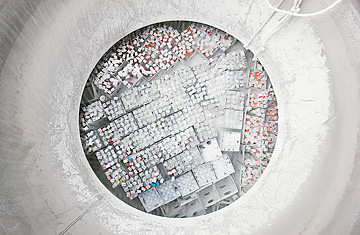
(2 of 4)
America's ejaculatory exceptionalism is not a result of American men's superior virility. Rather, quality control and wide product selection are the keys. The U.S. Food and Drug Administration requires testing for most sexually transmitted diseases, and with HIV, that means 180 days and multiple tests. Sperm banks study a donor's family medical history going back three generations. California Cryobank boasts that it's easier to get into Harvard than to become one of its sperm donors. Also, America has a very diverse population. So if you're a couple in a country like Japan, where third-party insemination is generally frowned on, finding a match in the U.S. is easy.
What's more, even as Seisler and other men reveal their identities to their very extended families, the U.S. still almost always makes anonymity an option--and that's driving overseas customers into American arms. In 2004, after the U.K. passed a law forbidding anonymity, the number of sperm donors plummeted far below what was needed to meet domestic demand. Similar changes in Canada's and Australia's privacy laws literally dried up local donations. Both countries now import more than 90% of their donated sperm. And for overseas shoppers who want to know the identity of the donor, there are plenty of American men like Seisler who happily come forward.
"People use American sperm because you can often know the donor and the regulations are strict," says Dr. Zeev Shoham, an Israeli fertility professor who runs a website, IVF-Worldwide.com that tracks 3,300 in vitro fertilization clinics worldwide.
But the sperm boom gives rise to a lot of complicated legal and medical questions. Could a remote biological heir seek a paternity declaration against a donor father and later make claims against Dad's estate? When a donor settles down and finally has kids he wants to raise, will those children want to meet their scattered tribe of half siblings? What recourse does a family abroad have if they're not happy with the product--say, if the child was born with a genetic illness? Every young industry has its growing pains, but in the sperm game, those problems can be for life.
An Expanding Market
One thing that makes sperm such a profitable commodity is that the customer base is huge. The World Health Organization estimated in 2006 that there were 60 million to 80 million infertile couples worldwide. Thus far, most international sperm business has been for heterosexual couples with fertility challenges, but that is changing as more cultures accept lesbians and single parents--two groups that compose by some estimates up to 60% of the U.S. market. When Shari Ann started looking, she couldn't find a clinic that accepted single mothers; now there are dozens in Canada.
